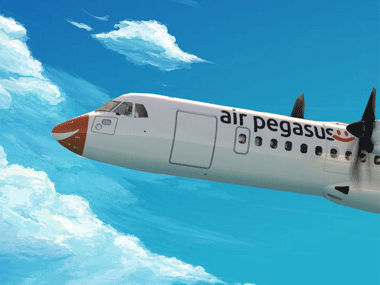New Delhi: In October 2012, Kingfisher Airlines stopped operations because its engineers refused to certify aircraft fit for flying. This was a culmination of a long list of woes that the airline was facing. What happened over the next few months is well documented. Eventually, the airline’s flying permit expired and it never flew again. In December 2014, SpiceJet had to cease operations for a day because of unpaid dues to oil companies but then, with gradual help from the government, it got back on its feet under a new promoter who presented a comprehensive turnaround plan. The return was in a smaller avatar but operations have continued uninterrupted since. Cut to 2016, and another airline has been unable to conduct its operations for two days running. Only this time, it is a regional carrier called Air Pegasus which was operating just three aircraft, connecting Bengaluru to smaller cities across South India. [caption id=“attachment_2182935” align=“alignleft” width=“380”]  Image courtesy: http://www.airpegasus.in[/caption] The suspension of operations of Air Pegasus is a cautionary tale, specially since the Centre has been emphasising enhanced regional connectivity through a draft scheme which caps fares on regional routes in return for some viability gap funding to airlines. The scheme is not yet finalised but essentially encourages airlines with smaller aircraft to launch flights to India’s hinterland while getting some help from the Central and state governments in the form of VGF. The severe fund crunch which crippled the operations of Air Pegasus in the last two days should serve as warning against pitfalls of this ambitious scheme. A source confirmed that operations of Air Pegasus remain suspended today as well, as the promoters continue to hold negotiations for getting back aircraft and infusing some urgently needed funds into the airline. This person confirmed that the “cash burn” at the airline is Rs 5 crore a month and that there is an immediate need of up to Rs 100 crore to fund operations. What could not be ascertained is whether the three ATR aircraft which Air Pegasus was operating till day before yesterday have been possessed by lessors or not. Pegasus began its journey in April last year and its promoters believed they had enough aviation industry experience to launch a regional airline. The promoter firm, Decor Aviation, is one of the big ground handling firms at major airports across South India. The source quoted earlier said Decor has done ground handling for major airlines including Kingfisher Airlines, Paramount Airways, SpiceJet and Air India across major airports such as Bengaluru and Trivandrum. This source said from the very beginning, the promoters of Air Pegasus were clear about not repeating “mistakes” made by Kingfisher or Paramount (both had to stop flying) and were keen to leverage their aviation industry experience by avoiding high-cost airports of Delhi and Mumbai. Which is why they thought of a schedule involving smaller cities down South where connectivity is required but not with a huge investment. So what went wrong? Devesh Agarwal, a Bengaluru based aviation expert and blogger says an inefficient business plan has been the problem. “An inefficient business plan resulted in less than desirable income, which in turn forced operations professionals to leave Air Pegasus. This has disrupted their schedule and driven away customers”. The Hindu Business Line newspaper said today in a piece that the airline is denying reports of shutting down operations and has maintained that the suspension of services was temporary. Another aviation industry veteran pointed out that regional airlines often start on the premise that each aircraft funded by the promoters will generate profits. “I know of another startup regional airline which has begun operations with just one aircraft. The promoters believe one ATR aircraft will do 10 flights daily, earn them profits and finance the leasing of a second aircraft, and so on. This is a flawed premise on many counts…How can the airline base its schedule based on just one aircraft? What happens if it develops a snag? The entire business plan for some of these regional airlines is based on inflated assumptions.” The story in HBL says Air Pegasus needs funds immediately and has been in talks with several lenders; discussions with a major Gulf carrier lie suspended. The source quoted earlier said the airline has raised Rs 200 crore in two earlier rounds of funding and is hopeful of raising close to Rs 100 crore more, soon. Not just fund crunch, Air Pegasus has also been accused on some safety violations which entailed an audit by aviation regulator DGCA earlier this year. According to anonymous mails sent out by employees, the list of allegations against Air Pegasus included forging pilot training records, violation of FATA rule which mandates licenses be issued afresh if a foreign pilot’s employment changes in India, having no approved flight dispatcher, multiple violations of weekly offs for crew etc. The source quoted earlier admitted there were “some issues earlier” which have been resolved since. This piece in the Hindustan Times speaks of the sudden DGCA audit after several complaints against the airline were received. Air Pegasus connects Bengaluru to Madurai, Chennai, Thriuvananthapuram, Hubli and Cochin. It has plans to expand its network to include Puducherry, Goa, Tuticorin and Trichy. Operations to Cuddappah have been suspended already because of thin traffic.
The suspension of operations of Air Pegasus is a cautionary tale, specially since the Centre has been emphasising enhanced regional connectivity through a draft scheme
Advertisement
End of Article


)

)
)
)
)
)
)
)
)



